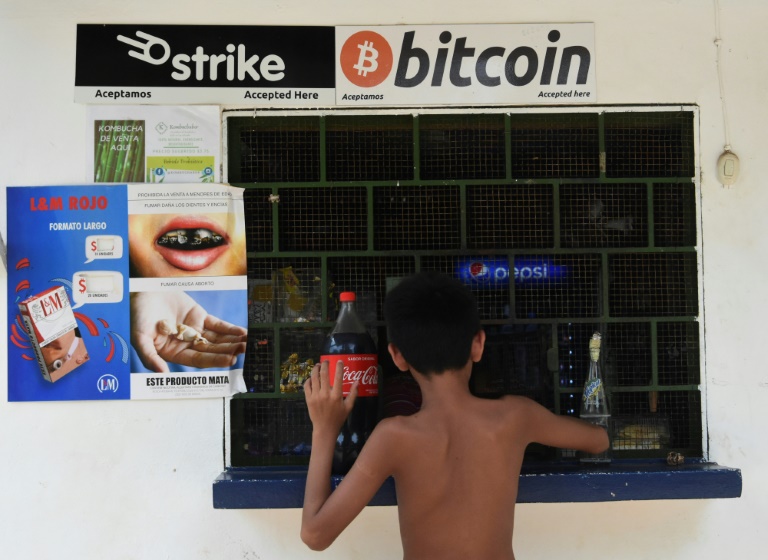El Salvador will soon become the only country in the world accepting bitcoin as legal tender, a cutting-edge but potentially risky new avenue for its large expat community to send money back home.
Experts and regulators have highlighted concerns about the cryptocurrency’s notorious volatility and the lack of any protections for its users, and some predict its widespread adoption may still be a ways off.
Early this month, El Salvador’s parliament approved a law to allow the crypto money to be accepted as tender for all goods and services in the small Central American nation, along with the US dollar, its national currency.
The bill, an initiative of President Nayib Bukele who is under fire domestically and abroad for moves to tighten his grip on power, was presented to lawmakers on a Tuesday and approved within 24 hours.
Bukele touted the move, which will take effect in September, as a way to prevent losses amounting to “millions of dollars” in transaction fees for remittances from abroad, traditionally sent in dollars via agencies such as Western Union.
The country of 6.4 million people is heavily dependent on remittances from its estimated 1.5 million expats — the transfers represent almost a quarter of its GDP.
According to World Bank data, El Salvador received more than $5.9 billion in 2020 from nationals living abroad, mainly in the United States.
This makes it the Latin American country receiving the most money from its diaspora as a percentage of its economy.
– ‘Ongoing experiment’ –
Now El Salvador is betting on a rise in remittances — which were down 4.8 percent last year — to boost its struggling economy which contracted 7.9 percent in 2020 largely due to the coronavirus epidemic.
“El Salvador’s decision to make bitcoin legal tender is an ongoing experiment that could be successful if bitcoin volatility continues to ease, with the overall direction remaining higher,” Edward Moya, a market analyst at the Oanda brokerage told AFP.
“In May, transfers of bitcoin to El Salvador quadrupled and that could grow if prices continue to rise.”
On Tuesday, however, the cryptocurrency fell beneath $30,000 for the first time in five months.
At its highest, bitcoin was worth more than $63,000 in April.
Manuel Orozco, director of the Center for Migration and Economic Stabilization in Washington, highlighted that bitcoin, like other cryptocurrencies, “lacks strong security controls”.
It is also “totally wrong to assume there will be no transaction cost,” he said.
Last week, the World Bank rejected a request from El Salvador for assistance in its bid to adopt bitcoin as a currency, citing “environmental and transparency shortcomings”.
Bitcoin and other cyber currencies are “mined” by solving complicated puzzles using powerful computers that consume enormous amounts of electricity — much of which is produced by coal plants.
Bitcoin is also criticized by regulators for its potential for illegal use — notably in laundering money from criminal activities and financing terrorism.
– Dollar or bitcoin?
–
The IMF has also flagged concerns, with spokesman Gerry Rice telling reporters El Salvador’s move “raises a number of macroeconomic, financial and legal issues that require careful analysis.”
The Central American Bank for Economic Integration (CABEI) has said it will provide technical assistance for El Salvador to regulate the use of bitcoin.
But it is the currency’s price instability that will likely most worry would-be users.
“For a currency to fulfil the function of a value reserve… it should not be so volatile”, said Oscar Cabrera, former president of the Central Reserve Bank of El Salvador.
A survey by the country’s Chamber of Commerce and Industry, published last week, found that 96.4 percent of the business community would prefer for bitcoin to remain optional, 93.2 percent of employees would rather get their wages in dollars, and 82.5 percent would continue using the greenback for remittances.
“El Salvador… will likely still use traditional methods (for remittances) until bitcoin can become a stable asset class,” said Moya.
For Orozco, there are potential pluses, including the generation of “significant liquidity that would generate a surplus for credit and investment”, as well as modernizing the banking system, to which many in El Salvador do not have access.
“In the short term, strategically, this is an opportunity for the Salvadoran financial system,” he said.
Already, bitcoin has brought a revolution to one town in El Salvador — El Zonte on the Pacific coast — where hundreds of businesses and individuals now use the currency for everything from paying utilities bills to buying a can of soda.
El Zonte has no banks and only one cash machine — in a hotel to which only guests have access.
Started as a project by an anonymous bitcoin donor, the town now boasts El Salvador’s only bitcoin teller machine where people deposit US dollars in cash into a personal bitcoin “wallet,” then use a smartphone app to spend it.











